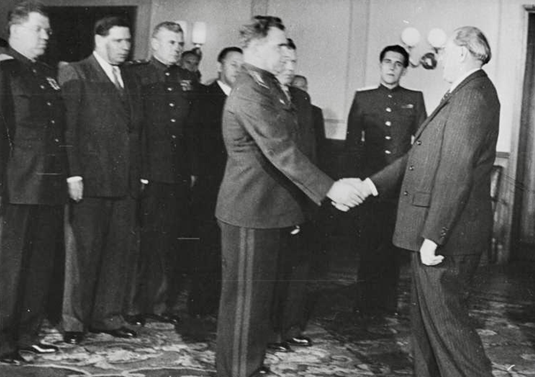A Marshal’s Final Request
- Maria A. Kithcart

- May 20, 2022
- 2 min read

Pictured: Marshal Chuikov’s obituary; photo of his gravesite and special carnations, taken 23 March 2022.
Marshal Chuikov was a leader who was not tied down by a template—both in battle and in life. Even when faced with his own death, this extraordinary soldier and public servant desired to be buried in the place that would forever be etched in his mind—Stalingrad—instead of opting for burial in Moscow. The fiery trials of the Battle of Stalingrad shaped his character and left an indelible mark on his life. Aside from the aftereffects of having survived such an ordeal—weeping eczema, nightmarish dreams, hearing loss, etc.—his time in the city as one of her defenders changed his perspective on life, so much so that he longed to be laid to rest with his soldiers who were buried at Mamaev Kurgan in a mass grave. Breaking with Soviet dignitary burial tradition, he made a final request:
“In July 1981, the seriously ill Marshal Chuikov wrote a letter to the Central Committee of the CPSU: Feeling the approach of the end of my life, I am fully conscious of asking: after my death, bury the ashes on Mamayev Kurgan in Stalingrad, where I organized it on 12 September 1942 my command post. ... Thousands of soldiers whom I commanded are buried there… In the same will, he asked that there be no monument on his grave.”
Michael Jones’ account in Stalingrad: How the Red Army Triumphed, wrote in more detail about Chuikov’s will:
"I wish to be buried at the Mamaev Kurgan…where you can hear the roar of the Volga waves, the sound of gunshot and feel the agony of Stalingrad’s ruins. Here lie buried many of the soldiers that I commanded. Warriors of the Soviet Union—follow the example of the defenders of Stalingrad, and victory will be yours."
Once the letter was written, Marshal Chuikov called his son to share the news of his decision to break with the tradition of the burial of Soviet Marshals in the Kremlin Wall Necropolis in Moscow. Alexander Vasilievich shared the following:
“’Father called me to his place and said that he wanted me to be one of the first to know that he sent the text of the will to the Central Committee of the CPSU. In it, he asked to be buried on Mamaev Kurgan. He said he wanted to lie with his soldiers.'”
After Marshal Chuikov passed in 1982, he made the journey back to the place to which he had given his heart—Stalingrad. He received a hero's farewell:
“After parting in Moscow, the coffin was sent to Volgograd. The whole city came out to say goodbye to Vasily Ivanovich. When he was carried around the city on a gun carriage, people without hats stood along the entire path of the funeral procession—thousands of people came to pay their respects. His grave is decorated with a black granite slab, on which is written: Twice Hero of the Soviet Union. Marshal of the Soviet Union. Chuikov Vasily Ivanovich (12.II.1900-18.III.1982). Eternal glory!
The will of the legendary commander was fulfilled. Chuikov is one of only two Marshals of the Soviet Union in history buried outside of Moscow.”



